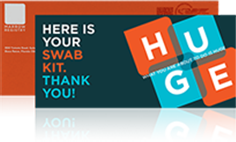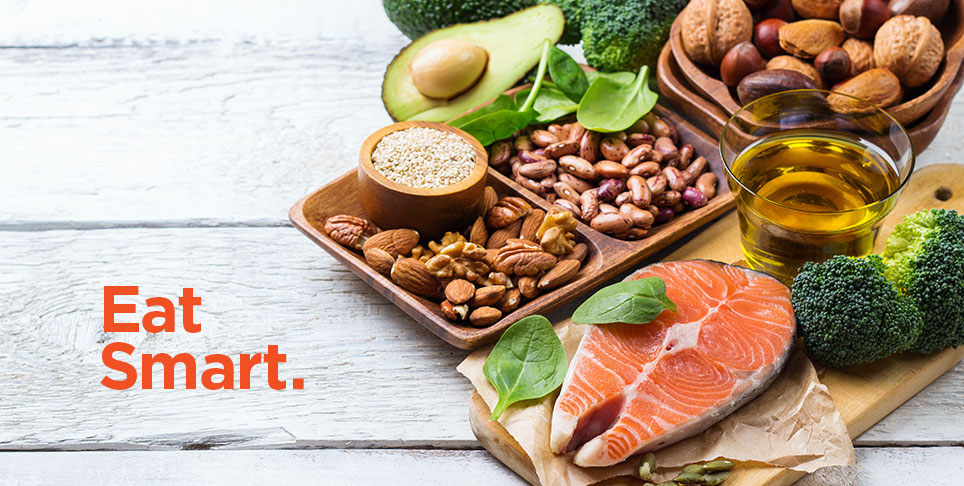More Information:
Speed Swab Kit

Help give someone the BIGGEST day of their life!
Order your speed swab kit today and get on the registry!
Order Your KitNutrition & Cancer
Nutritional support for cancer patients is an important part of patient care. Cancer patients are generally confused about nutritional matters; for example, what is the best diet, what are good foods and bad foods, which supplements are best, and will antioxidants help or hurt?

There is conflicting information on this topic, but most experts agree that to prevent cancer, a plant-based diet rich in vegetables, fruit, legumes, whole grains, nuts, quality protein, and healthy fats is the best approach. Intake of high-fat foods, particularly from animal sources, should be limited. Avoid charred food and limit refined sugar. This is an anti-inflammatory diet, and inflammation underlies the initiation of cancer, as well as heart disease.
For the cancer patient, my recommendations are consistent with preventive nutritional guidelines with emphasis on adequate protein, low glycemic carbohydrates, and omega-3 fats. Cancer and its treatment can increase protein requirements, and if this demand is not satisfied dietarily, the body recruits protein from muscle tissue. This may lead to cancer cachexia weight loss, a muscle wasting process. Clinical nutritionists can monitor this condition and take measures to correct it.
Some cancer patients lose a lot of weight, but others gain it. Weight gain after diagnosis can make the prognosis worse. Try to maintain a healthy weight during and after treatment. It has been hypothesized that obesity and associated inactivity are major determinants of some cancers. Whether it is total fat in the diet or the increased body mass that increases risk for cancer is a continuing debate.
We do not eat nutrients, we eat food. The benefit of eating a variety of fruits and vegetables are that there is a chorus of phytochemicals present that work to keep us healthy. Isolated nutrients aren’t as helpful and can sometimes do harm.
Cancer and cancer treatment can cause nutrition-related issues such as an altered sense of taste, loss of appetite, constipation, diarrhea, difficulty swallowing, dry mouth, mouth sores, nausea and vomiting, weight gain, and weight loss. Nutritionists trained in oncology can help minimize these side effects. For example, I recommend that patients with mouth sores (mucositis) use a straw to direct fluids away from painful areas of the mouth. Patients with nausea feel better when they eat foods cold or at room temperature—the aromas of hot foods can worsen the nausea.
Bone marrow transplant (BMT) patients have unique nutrient requirements. Caloric needs are increased early post-transplant to account for the metabolic stress induced by the preparative regimen, fever, infection, and other metabolic complications. Protein requirements are also higher to promote tissue repair after cytoreduction and to spare breakdown of lean body mass. Protein needs may be further increased with corticosteroid therapy (Prednisone).
Patients on immunosuppressive therapy (Cyclosporine and Prednisone) should follow safety guidelines for food preparation and storage. Certain foods should be restricted during the course of immunosuppressive therapy such as unpasteurized milk and milk products, aged cheese, raw honey, unwashed raw vegetables and fruit, and all miso products. Additionally, the immune suppressed patient should not consume grapefruit or grapefruit juice because it interacts with transplant rejection drugs.
Cancer survivorship should be recognized as a distinct phase of cancer care. As a patient moves on after treatment, their medical team usually gets narrower despite the increased risk for secondary cancers and heart disease. Nutrition professionals can play an active role in monitoring blood lipids, weight, body composition, blood sugar, and other biomarkers for the extended survivor.
Good nutrition is central to a healthy lifestyle that helps to prevent diseases including cancer. For the cancer patient, nutrition can 1) help prepare the patient pre-treatment, 2) minimize side effects of treatment, 3) accelerate the healing process, and 4) help reduce risk of recurrence as well as strengthen the patient post-treatment.
By Francine Blinten, M.S., C.C.N.
Francine Blinten earned a Master of Science in Bionutrition and is a certified clinical nutritionist with a subspecialty in oncology nutrition. She can be reached via email at fblinten@yahoo.com.
Speed Swab Kit

Help give someone the BIGGEST day of their life!
Order your speed swab kit today and get on the registry!
Order Your Kit